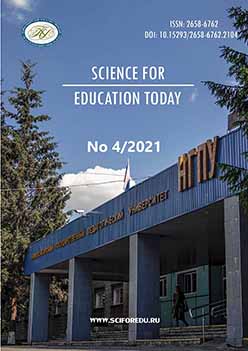Изучение оценки студентов как этап конструирования проактивной подготовки к воспитательной деятельности
Studying students’ opinions as a stage of designing proactive preparation for providing moral education
Author(s): Elena Mikhailovna Kharlanova, Svetlana Vasilyevna Roslyakova, Nadezhda Valeryevna Sivrikova, Tatyana Genad`evna Ptashko, Nadezhda Anatolyevna SokolovaSubject(s): School education, Higher Education , Sociology of Education
Published by: Новосибирский государственный педагогический университет
Keywords: Moral education; Proactivity; Proactive preparation; Subjectivity; Interaction;
Summary/Abstract: The article is devoted to the problem of taking into account students’ opinions (their attitudes, preferences and suggestions) in preparing future professionals in the social sphere for providing moral education. Traditionally, students are included in the assessment of the implemented degree program in order to evaluate its outcomes, but their capacity to influence the transformation of programs has not been properly investigated. The purpose of this article is to study students’ opinions about their satisfaction with university preparation for providing moral education in order to improve its quality. Materials and Methods. By adopting a systematic approach, the authors have used the following theoretical methods: systemic analysis, synthesis, and modeling. An online survey was conducted to collect empirical data. The study involved 674 undergraduate students (3rd, 4th and 5th years). For the mathematical analysis, Cramer V-test was used. Results. The authors justify the expediency of developing a proactive programme aimed at preparing undergraduates for providing moral education, within the framework of which students are involved in the interaction and transformation of themselves, educational practices and educational environment, responding to urgent tasks and challenges of the future. The study has revealed general satisfaction of students with their preparation for providing moral education, as well as a range of shortcomings. Significantly, there is a correlation between the dissatisfaction with university preparation and proposals for improving it. It is noted that students’ proposals are aimed at changes in all subsystems of proactive training: subject-environmental (ensuring engaged collaboration of stakeholders both on-campus and off-campus); contents (enhancing practical components of the curriculum and ensuring students’ personal development); procedural (using active and interactive teaching methods). However, the implementation of students’ proposals requires collaborative efforts of all the stakeholders who create conditions for the manifestation of students’ subjectivity. At the same time, students’ proposals is a valuable resource for the transition to proactive preparation for providing moral education. The research findings have enabled the authors to clarify the purpose, content, methods of ensuring students’ subject position in proactive preparation for providing moral education. Conclusions. The investigation of students’ opinions has expanded the understanding of risks and opportunities for improving preparation for providing moral education, indicated the significance of proactive training future professionals in the social sphere for providing moral education and the need to ensure the continuing development of students’ subjectivity in the process of studying, implementation, critical analysis and transformation of practical educational activities into interactions with other subjects. The introduction of tools for collaborative thinking and action in the process of practical training will enable students to influence its implementation and improvement.
Journal: Science for Education Today
- Issue Year: 11/2021
- Issue No: 4
- Page Range: 46-63
- Page Count: 18
- Language: Russian

